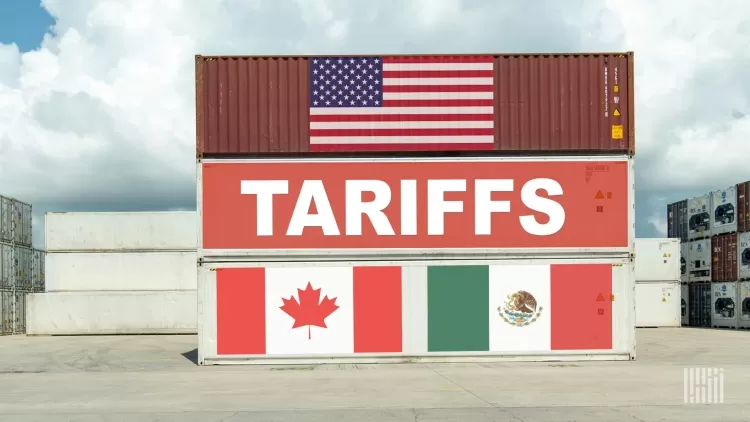Tariff Wars and Their Ripple Effect on Global Markets: The Rising Cost of Living in the U.S.
As global tariff wars escalate, the latest round of U.S. tariffs on Canada, Mexico, and China is significantly affecting the American economy. Consumers are expected to face higher prices on a wide range of goods, from everyday household items to automobiles, as businesses pass on the increased costs. While the White House asserts that these measures will strengthen American industries, economists warn that the burden will likely fall on consumers, reshaping their spending habits and squeezing household budgets.

Context & Background:
The ongoing trade tensions between the U.S. and its major trading partners—Canada, Mexico, and China—have led to a new wave of tariffs. These tariffs function as taxes on imports, driving up the cost of foreign-made goods. While the U.S. government argues that these tariffs will protect domestic industries and reduce reliance on foreign products, the economic fallout is already being felt by American consumers.
Tariffs have long been a tool in international trade policy, but their impact extends beyond the immediate trade dispute. By imposing tariffs, the U.S. government is forcing businesses to absorb higher costs, which are often passed on to consumers in the form of increased prices. As a result, products ranging from clothing and electronics to fuel and food are expected to rise in price, affecting the daily lives of American households.
Main Developments:
The latest round of tariffs is targeting a broad range of goods, including clothing, electronics, household items, and automobiles. As the U.S. continues to place tariffs on imports from China, Mexico, and Canada, the costs of many goods are expected to climb. Chinese-made products, in particular, are heavily affected, with the cost of electronics and clothing expected to rise sharply. As a major manufacturing hub, China is the source of many goods that are staples in the American consumer market.
The automotive industry, already grappling with the rising costs of materials, is also facing price hikes as tariffs are imposed on imported car parts from Canada and Mexico. Both new and used car markets are expected to see higher prices, which could dampen consumer demand in the long run. Additionally, the tariffs on Canadian energy sources could lead to higher fuel prices, adding further strain to household budgets. Gas prices could rise by 20-25%, putting upward pressure on daily living costs.
Food prices are another area of concern. With Canada and Mexico supplying nearly half of the U.S.'s vegetable imports, the tariffs on these nations are expected to drive up the cost of fresh produce. Processed food and beverages could also see price increases as tariffs affect ingredients and packaging materials, further inflating grocery bills. In total, the higher costs on everyday goods and services are likely to create a noticeable impact on U.S. households.
Analysis:
The growing wave of tariffs comes at a time when many American households are already facing financial pressure. The increase in costs for basic goods, such as food and fuel, will likely push many families to reconsider their spending habits. While some may turn to cheaper alternatives or reduce discretionary spending, others may feel the impact more sharply, particularly those with lower incomes.
Economists warn that these price increases could lead to inflation, which would erode purchasing power and reduce the standard of living for many Americans. The resulting strain on household budgets could have a ripple effect on the broader economy, reducing consumer confidence and stalling economic growth. Although the U.S. government expects tariffs to bolster American industry by reducing foreign competition, the higher prices on imported goods could hurt domestic consumption and limit overall economic expansion.
Despite these challenges, some domestic producers may benefit from the reduced competition, potentially leading to lower prices for certain U.S.-made goods. Additionally, some global suppliers may reduce prices to remain competitive in the face of increased tariffs, which could offset some of the price hikes. However, these benefits may be outweighed by the broader economic challenges that tariffs create.
Regional Focus:
The U.S.'s economic relationship with Canada, Mexico, and China is central to the trade dispute, and the impact of these tariffs will vary across regions. For example, border states that rely heavily on trade with Mexico and Canada, such as Texas and Michigan, may feel the brunt of higher prices on agricultural products and automotive parts. Similarly, U.S. manufacturers who depend on Chinese-made components will face rising production costs, potentially leading to higher prices for consumers across the country.
The agricultural sector is likely to be particularly affected by the tariffs on imported vegetables and other food items. The Midwest and other farming regions that rely on trade with Mexico may face challenges as their supply chains are disrupted. However, some regions may see benefits as certain domestic producers are able to capitalize on reduced foreign competition, particularly in industries like manufacturing and energy.
Conclusion:
As the U.S. escalates its trade disputes with Canada, Mexico, and China, the consequences for American consumers are becoming increasingly evident. The latest round of tariffs will likely lead to higher prices on everyday goods, from clothing and electronics to food and fuel. While the U.S. government maintains that these tariffs will protect American industry, the reality is that consumers will bear much of the cost through higher prices and inflation.
The impact of these tariffs highlights the unintended consequences of escalating trade wars, as rising costs squeeze household budgets and reduce consumer spending. While some domestic producers may benefit from reduced foreign competition, the broader effects of these tariffs could slow down economic growth and negatively affect U.S. households. As the situation evolves, it remains to be seen whether the trade war will lead to greater economic stability or continued financial strain for American consumers.
What's Your Reaction?
















